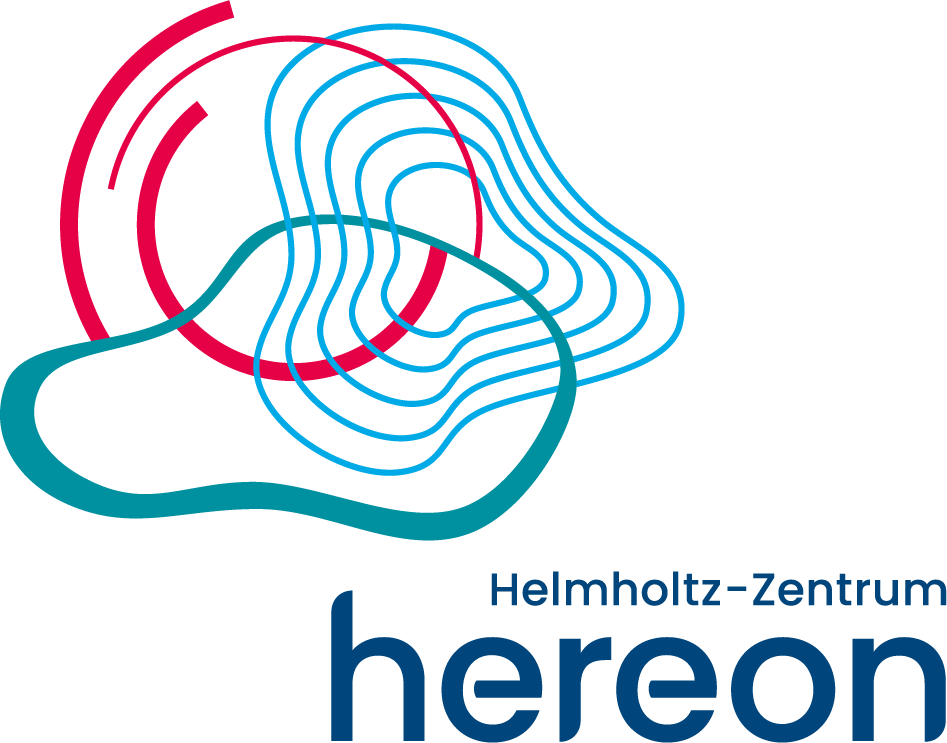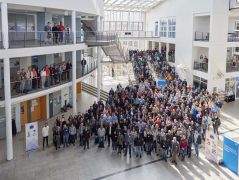MLZ is a cooperation between:
 > Technische Universität München
> Technische Universität München > Helmholtz-Zentrum Hereon
> Helmholtz-Zentrum Hereon
 > Forschungszentrum Jülich
> Forschungszentrum Jülich
MLZ is a member of:
 > LENS
> LENS > ERF-AISBL
> ERF-AISBL
MLZ on social media:

MLZ (eng)
Lichtenbergstr.1
85748 Garching
30.04.2024
Machine Learning Conference: Innovations and Impulses in Garching
From 8 to 10 April 2024, researchers met in Garching for the first “Machine Learning Conference for X-Ray and Neutron-Based Experiments”. The conference focussed on how AI systems can help analyze large amounts of data from experiments and provide new approaches.

The conference dinner is a classic part of MLZ conferences (top left); the group photo of the conference participants (top right); the poster session on Tuesday (bottom left); the large hall of the Bürgerhaus Garching during a lecture (bottom right). © FRM II / TUM
Machine learning (ML) enables the efficient analysis of large amounts of data and thus accelerates the research process. This technology also harbors great potential in neutron and X-ray experiments. In order to bring together ML experts, users of neutron and X-ray experiments, and all those already working at the interface of these fields, the Lawrence Berkeley National Laboratory had organized the “Machine Learning Workshop for X-ray and Neutron Scattering” in April 2023, which met with a very positive response.
Welcoming the guests at the MLZ
One year later, the Heinz Maier-Leibnitz Zentrum (MLZ) hosted the first “Machine Learning Conference for X-Ray and Neutron-Based Experiments.” The Scientific Director of the FRM II, Prof. Dr. Christian Pfleiderer, and the former Scientific Director, Prof. Dr. Peter Müller-Buschbaum, welcomed the 184 participants, some of whom had traveled from as far as China and the USA, in an introductory speech before the scientific program began.

On the third day of the conference, participants had the opportunity to visit the Research Neutron Source FRM II. © FRM II / TUM
Keynote speakers from all over the world
The first two days of the conference took place at the Bürgerhaus Garching, where the latest research findings were presented in 32 lectures (three of which were held via video link). The range of topics was broad. For example, Dr Kevin Yager (Brookhaven National Laboratory) described how he uses machine learning to allow computers to conduct experiments autonomously. In contrast, Andy Sode Anker from DTU Copenhagen showed in his presentation that generative AI could be used to support the training of ML models to analyze scattering and spectroscopic experiments.
Hands-on workshops and reactor tours
On the third day, over 60 visitors came to the MLZ site at the Garching research campus to take part in practical workshops on the application of ML models and guided tours of the FRM II research neutron source. The latter offered researchers with a non-physics background, particularly the opportunity to better understand a large-scale research facility such as the FRM II and exchange ideas with the experts on site.
A continuation of this successfully introduced conference format is already being planned for next year in the USA.
More information:
Conference website for the “Machine Learning Conference for X-Ray and Neutron-Based Experiments”
Related News
MLZ is a cooperation between:
 > Technische Universität München
> Technische Universität München > Helmholtz-Zentrum Hereon
> Helmholtz-Zentrum Hereon
 > Forschungszentrum Jülich
> Forschungszentrum Jülich
MLZ is a member of:
 > LENS
> LENS > ERF-AISBL
> ERF-AISBL
MLZ on social media:





